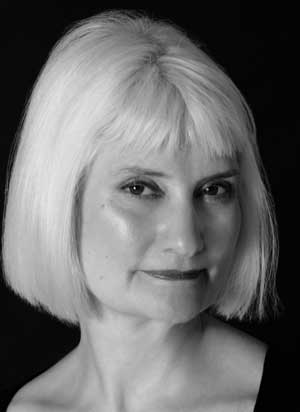
Terese Svoboda’s writing rarely goes where you’d expect. Her memoir Black Glasses Like Clark Kent exposes a family secret and reveals ambiguous wartime horrors; the novel Pirate Talk or Mermalade seems to be a straightforward seafaring yarn (albeit one told entirely in dialogue), but gradually becomes more surreal, the relationships at its center shifting and evolving. Her newly reissued novel Tin God juxtaposes two narratives: a grimly comic crime story set in the prairie and an account of a conquistador centuries earlier. Bringing the two together is the novel’s narrator: God, who, in the present day, is living life in a small town and is an occasional (or, really, omnipotent) witness to the proceedings. I checked in with Svoboda to learn more about the novel’s origins, its cosmology, and more.
Tin God features numerous disparate elements, from God living in a small rural town to a conquistador roaming the plains to an artistic endeavor evoking Stonehenge. How did all of these pieces come together into one novel?
Tin God developed out of two too short stories and it took several years before I found the voice of God to join them. Mulling over what they had in common, I came up with land, not too surprising since I’ve often written about it, but it took some time.
Both Tin God and Bohemian Girl feature history that comes in layers, whether overtly (as in the former) or revealed more subtly (as in the latter). How far along in the writing process do these layers come to you?
The layers of history appears as a result of my thinking as a poet looking for resonance. Unless you’re referring to something in particular, I think (very grandly) that history is embedded in every word, and certainly in every scene–personal as well as political history.
When working with history, do you generally research a particular period, or write about areas and eras where you already possess an abundance of knowledge?
I am now struggling with a biography/memoir and although I have the first hundred pages in order, I am drowning in research. When luxuriating on a novel of the past, I write the whole arc of the story out and only at the end do research, trusting that what flimsy knowledge gained through the movies and histories and memoirs will hold up until I need precision. In the later revisions, I will use research to get past a knot or excite a paragraph.
What will the biography be about? Will the style be similar to Black Glasses Like Clark Kent, or in a different vein?
St. Lola: A Biography of Lola Ridge is trying to be a biography/memoir, which is what Black Glasses forced me into. Black Glasses — and St. Lola — both insist(ed) on footnotes which bely the pleasure of research.
Lola Ridge was an anarchist feminist Modernist poet, a New Zealander who conquered literary New York just after the turn of the century with a wonderful book In the Ghetto about Jews on the Lower East Side.
Dare I ask: where did you first encounter Lola Ridge’s work?
Robert Pinsky ran a wonderful Slate column on her work in 2011 and it was love at first sight. She was the missing modernist link between Whitman and Adrienne Rich. I gave a talk on her at Poets House, and wrote a piece for the Academy of American Poets’ American Poet magazine.
And, to jump back to Tin God — was there anything in particular that led to the book being reissued now? It definitely seems to fit nicely beside both Bohemian Girl and Pirate Talk.
Out of the blue arrived the request from Bison Books to reissue. I imagine it had to do with whatever success the press had with the publication of Bohemian Girl in 2011 and their reissue of Trailer Girl and Other Stories in 2009.
How did the cosmology of Tin God — from God’s small-town life to the notion of incarnates — come about?
I decided on an omnipotent point-of-view because of all the trouble I had with Cannibal‘s pov. With Cannibal, I tried third person for about ten years, until an agent suggested first. I dutifully–without a computer — changed the pronouns, ignorant of the effect even while retyping it. It took a cathartic six sessions with Lish to recognize the power of my own voice–and the confession from the man I was with in Africa that he was (or was not? — never clear) C.I.A. so I knew I didn’t know anything about his motives, as well as the admission that I didn’t know what was going on in the heads of the Africans because the outcomes were often so surreal — to come up with its extreme first person. Also, as the eldest of nine siblings, I was not unfamiliar with a god-like tone. In order to join the two disparate stories, I joked for a while that what I needed was god. Then I just put Her to work.
When you were writing the book, was it a conscious choice to reference animals in the names of multiple major characters?
Pork had his name long before I realized it was derived from “porque.” Bessie, his mother, who was named after the cow that appeared on milk bottles with such a happy face, dotes on him. Both appellations are meant to be endearing, not derogatory.
“Discovery’s not for Me,” God says at one point in the novel — and you make a good case for what omnipotence would do to a narrator. Did you have any other novels in mind as reference points for writing from a divine perspective?
The only book I know narrated by God is Tibor Fischer’s Good to be God, of course male, and I read it just last year. You probably know some!
Photo: Joyce George
Follow Vol. 1 Brooklyn on Twitter, Facebook, Google +, our Tumblr, and sign up for our mailing list.
